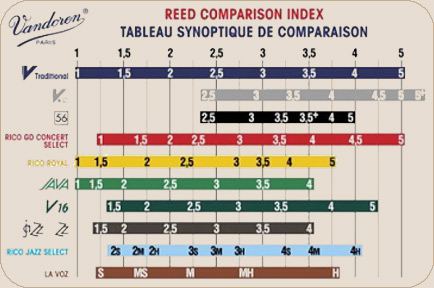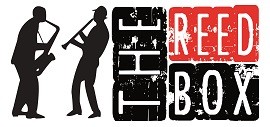FAQ
Frequently Asked Questions :
What is the best way to keep your reeds ready to play?
Play the reeds every day for just a few minutes to maintain moisture levels.
How do I play with a reed too tough or too easy to play ?
If a reed is too tough, rub its table (flat part of the reed) on fine sandpaper, in light circular motions. If a reed is too easy, cut the end of the reed with a hair.
Is it better to soak a reed with water or with saliva?
It may be better to use water to wet the reed. Some people have a more acidic saliva that will wear the fibers of the reed faster. Be careful, however, not to leave a reed in the water for too long, as this can distort it.
What is the best reed strength to start with ?
It all depends on the material used (as well as the mouthpiece and the instrument)! In general, the 2 ½ is quite suitable for new musicians.
Useful Tips :
- Do not play reeds that too strong or too weak, that is to say, poorly adapted to the opening of the mouthpiece.
- Prepare the reeds: play them a few minutes a day before you play them properly.
- Do not get used to a single reed. The ligature relaxes as the reed weakens. All new reeds then appear too strong .
- Choose a reed according to where you play:
- an easier reed in a dry place (air conditioning)
- a harder reed in a dull room, in the open air, or in a damp place.
- For example, a musician used to playing with a 3 1/2 reed will choose a reed no. 3 if playing in a room with air conditioning, or a reed no. 4 if playing in a very humid area .
You have to think positively about your reeds!
My students tell me : “ You always have good reeds "and I said to them:" yes, they are the same as yours! "Henri Dionet (ex-soloist at the Opera and professor at the Versailles Conservatoire)
Interview between Guy Dangain and Jean-Paul Gauvin
Is the reed fundamental to producing music?
Of course, the reed is used to shape the sound (...), it's more than a piece of wood, it's the soul of the player.
Should you have one or more reference reeds ?
Any passionate and serious musician does not have just one reference reed; they have reeds that allow them to find an "ideal". In addition, rotating reeds is important: the more one gets used to playing different strengths of reeds, the more these reeds eventually stabilise. It is not a question of copying your neighbor, because he uses up 2 reeds per month or on the even uses 2 boxes. The essential thing is that each musician finds their ideal reed!
What is the ideal position for the reed on the mouthpiece ?
The physicality of each mouthpiece means that they don’t always work in harmony with the reed. On the other hand, there is today a great diversity of mouthpiece (example: wide or fine opening at the end of the mouthpiece). Which leads us to think that the position of the reed can vary.
Some more tips:
A reed that is a little easier to play can work better by making it protrude slightly from the mouthpiece (it will find a roundness of sound while maintaining its flexibility).
The lateral displacement of the reed (left or right) can lead to finding the perfect balance.
Some more ideas...
In addition to the quality of the reed, the main factors that influence the performance of a reed are :
- materials : its association with other elements
- physical : the embouchure (lips, jaws and space inside the mouth) and the air column
- physiological : the acidity of saliva for example
- climatic and acoustic: the time, the sonic environment in which you play, and the wood too ...
Faced with these changing parameters, the key word is "adaptation" at all times. It is very useful to limit the subjectivity as much as possible by:
- knowing the reactions of the material in different situations
- by asking the opinion of musicians who know your playing style
Above all, in order get the best out of your reeds, you must “optimise” them.
To avoid playing a new reed for too long, play a reed a little stronger than its initial strength. To help “break-in” this new reed, it can be a good idea to change the mouthpiece according to varying situations.

